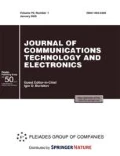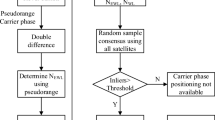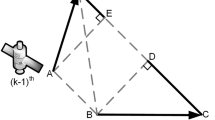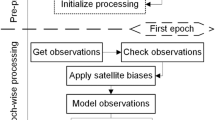Abstract—
The problem of synthesis of optimal and quasi-optimal algorithms for receiving and processing BOC signals intended for use in global navigation satellite systems (GNSSs), such as GPS (USA), Galileo (European Union), GLONASS (Russia), and BeiDou (China), is solved on the basis of the Markov theory of random process estimation by the method of step-by-step solution of the Stratonovich equation. The problem of optimal nonlinear filtering is solved in relation to a vector discrete-continuous Markov random process for the case when its continuous part is a vector diffusion Markov process, and the discrete part is characterized by a simple Markov chain of several positions. It is assumed that useful BOC signals are observed against a background of additive white Gaussian noise. The main analytical relations of optimal and quasi-optimal algorithms for receiving and processing BOC signals are presented, as well as the corresponding block diagram of a quasi-optimal system for receiving and processing GNSS BOC signals. The results of the study are also applicable in cases of noise-like signals of modern GNSSs, for which BOC signals are not used yet.


Similar content being viewed by others
REFERENCES
J. W. Betz, in Proc. Nat. Tech. Meeting Inst. Navigat. (ION–NTM’1999), Jan. 1999 (ION, 1999), p. 639.
J. W. Betz, Navigation. J. ION 48 (4), 227 (2001).
G. W. Hein, J. Godet, J.-L. Issler, et al., in Proc. Inst. Navigation Global Positioning System Meeting (ION GP, 2002), Portland, Sep. 24–27, 2002 (ION, Fairfax, 2002), p. 266.
M. S. Yarlykov, Meander Noise-Like Signals (BOS signals) and Their Varieties in Satellite Radio Navigation Systems (Radiotekhnika, Moscow, 2017) [in Russian].
J. W. Betz, in Proc. ION GPS, Salt Lake City, Utah, Sept. 19–22, 2000 (ION, 2000), p. 2140.
G. Lachapelle and M. Petovello, Inside GNSS, May/June 1 (4), 22 (2006).
J. W. Betz, M. A. Blanco, Ch. R. Cahn, et al., in Proc. 19th Int. Tech. Meeting Satellite Division Inst. Navigation (ION GNSS 2006), Sept. 2006 (ION, 2006), p. 2080.
S. Wallner, G. W. Hein, and J.-A. Avila-Rodriguez, in Proc. Eur. Space Agency, Navitec 2006, Noordwijk, the Netherlands, Dec. 2006. CD ROM.
O. Julien, Ch. Macabiau, J.-L. Issler, and L. Ries, Inside GNSS, Spring 2 (3), 50 (2007).
G. X. Gao, CD ROM Stanford Univ. Position, Navigation and Time (PNT) Symp., 2010.11.09.
V. S. Shebshaevich, P. P. Dmitriev, N. V. Ivantsevich, et al., Network Satellite Radio Navigation Systems (Radio i Svyaz’, Moscow, 1993) [in Russian].
Yu. A. Solov’ev, Systems of Satellite Navigation (EKO-TRENDZ, Moscow, 2000) [in Russian].
R. L. Stratonovich, Conditional Markov Processes and Their Applications in Optimum Control Theory (Mosk. Gos. Univ., Moscow, 1966) [in Russian].
M. S. Yarlykov, Application of Markov Theory of Nonlinear Filtering in Radio Engineering (Radio i Svyaz’, Moscow, 1993) [in Russian].
M. S. Yarlykov and M. A. Mironov, Markov Theory of Estimation of Random Processes (Radio i Svyaz’, Moscow, 1993) [in Russian].
V. A. Cherdyntsev, Statistical Theory of Multiplexed Radio Systems (Vysheish. Shk, Minsk, 1980) [in Russian].
V. I. Tikhonov and V. N. Kharisov, Statistical Analysis and Synthesis of Wireless Devices and Systems: School Textbook for College (Radio i Svyaz’, Moscow, 1991) [in Russian].
Global Positioning Systems Directorate. Systems Engineering and Integration. Interface Specification IS– GPS–200. – Navstar GPS Space Segment/Navigation User Interfaces, IS–GPS–200G, 05 September 2012.
L. E. Varakin, Communications Systems with Noise-Like Signals (Radio i Svyaz’, Moscow, 1985) [in Russian].
M. S. Yarlykov, Statistical Theory of Radio Navigation (Radio i Svyaz’, Moscow, 1985) [in Russian].
M. S. Yarlykov and S. M. Yarlykova, J. Commun. Technol. Electron. 51, 874 (2006).
M. S. Yarlykov and V. Yu. Shishkin, Radiotekh. Elektron. (Moscow) 37, 260 (1992).
S. M. Yarlykova, J. Commun. Technol. Electron. 48, 1247 (2003).
M. S. Yarlykov and S. M. Yarlykova, Radiotekhnika, No. 7, 18 (2004).
Author information
Authors and Affiliations
Corresponding author
Additional information
Translated by T. Sokolova
Rights and permissions
About this article
Cite this article
Yarlykov, M.S. Optimal and Quasi-Optimal Algorithms for Receiving and Processing BOC Signals in Promising Global Navigation Satellite Systems. J. Commun. Technol. Electron. 66, 34–55 (2021). https://doi.org/10.1134/S1064226921010101
Received:
Revised:
Accepted:
Published:
Issue Date:
DOI: https://doi.org/10.1134/S1064226921010101




